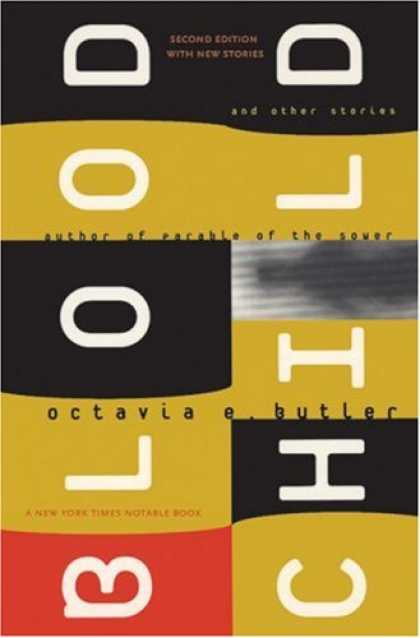There’s nothing like reading a short story collection for seeing a writer’s concerns in focus. Butler says in the introduction that she was a natural novelist who rarely wrote short stories, and I entirely understand this, as I’m the same way. I do believe that many writers have a natural length—Theodore Sturgeon’s was the short story, Kate Elliott’s is the seven-volume novel. Of the five short stories in Bloodchild and Other Stories, three strike me as brilliant and the other two kind of meh. But the overall effect of re-reading them all today was to see them as a distillation of all the things Butler wrote about—aliens, alien invasion, disease, genetics, biology, powerlessness, collapse of society, and the tiny human choices that bring hope. These are all through her novels—I’ve read everything but Fledgling (hate vampires so much)—and here they are in a concentrated form.
“Bloodchild” the novelette quite rightly won the Hugo and Nebula. It’s about a human adolescent male living on a planet where a colony of humans live in a preserve in an uneasy symbiosis with aliens. Butler says in the afterword that it’s the story of a male pregnancy, but having alien grublike larva attached to your veins until they eat their way out of you is a very strange pregnancy. Everything about this story works—the voice of the narrator, the aliens, the pacing, the subtle and unsubtle parallels, the family relationships, the worldbuilding, the pacing of revelation. It’s horrible—I can’t read it without cringing—and it’s surprising, and somebody should sit Margaret Atwood down with it and show her what it’s possible to do with talking squid in outer space. (The aliens are not squid. They live on land and have ovipositors.) Butler says in her afterword that the story has a happy ending. That’s not at all how I read it.
“The Evening and the Morning and the Night” is about people with a genetic disease that’s caused by a cancer cure, and it’s really about how your genes shape people’s lives and choices. Butler’s voice here and the speed at which she feeds you information about what the disease is and how it works is chilling and astonishing.
The third brilliant story in the collection is the Hugo-winning “Speech Sounds.” There’s been a disease that works something like having a stroke, the ability to speak and/or read and write and reason are impaired. Civilization has broken down. This is the story of Rye, a woman trying to go twenty miles to Pasadena among people whose only reliable language is body language. It’s about the people she encounters on the way. It’s a very stark story but again the worldbuilding and Rae herself are wonderful—reading it feels like being there, and finishing it makes you very glad not to be there. I read it on the bus, which is particularly appropriate. This feels as if it could easily have been the beginning of a novel. If it was, I’d read it. There’s an addictive quality to Butler’s prose—a lot of “IWantToReadItosity”—but it would be unbearable, so I’m glad it isn’t any longer. It does end on a note of hope.
The two “meh” stories are “Near of Kin,” a quiet story about incest, and “Crossover,” which may be a ghost story. They don’t sing in the same luminous way the others and Butler’s novels do for me. The collection concludes with a couple of fine essays about Butler’s struggle to be and become a writer—and she talks explicitly about how unusual she was as a black female science fiction writer at the time when she started publishing. She also talks about her struggle to improve as a writer and how long it took her to get good.
This is a very short collection, but very well worth reading.
Jo Walton is a science fiction and fantasy writer. She’s published eight novels, most recently Half a Crown and Lifelode, and two poetry collections. She reads a lot, and blogs about it here regularly. She comes from Wales but lives in Montreal where the food and books are more varied.










